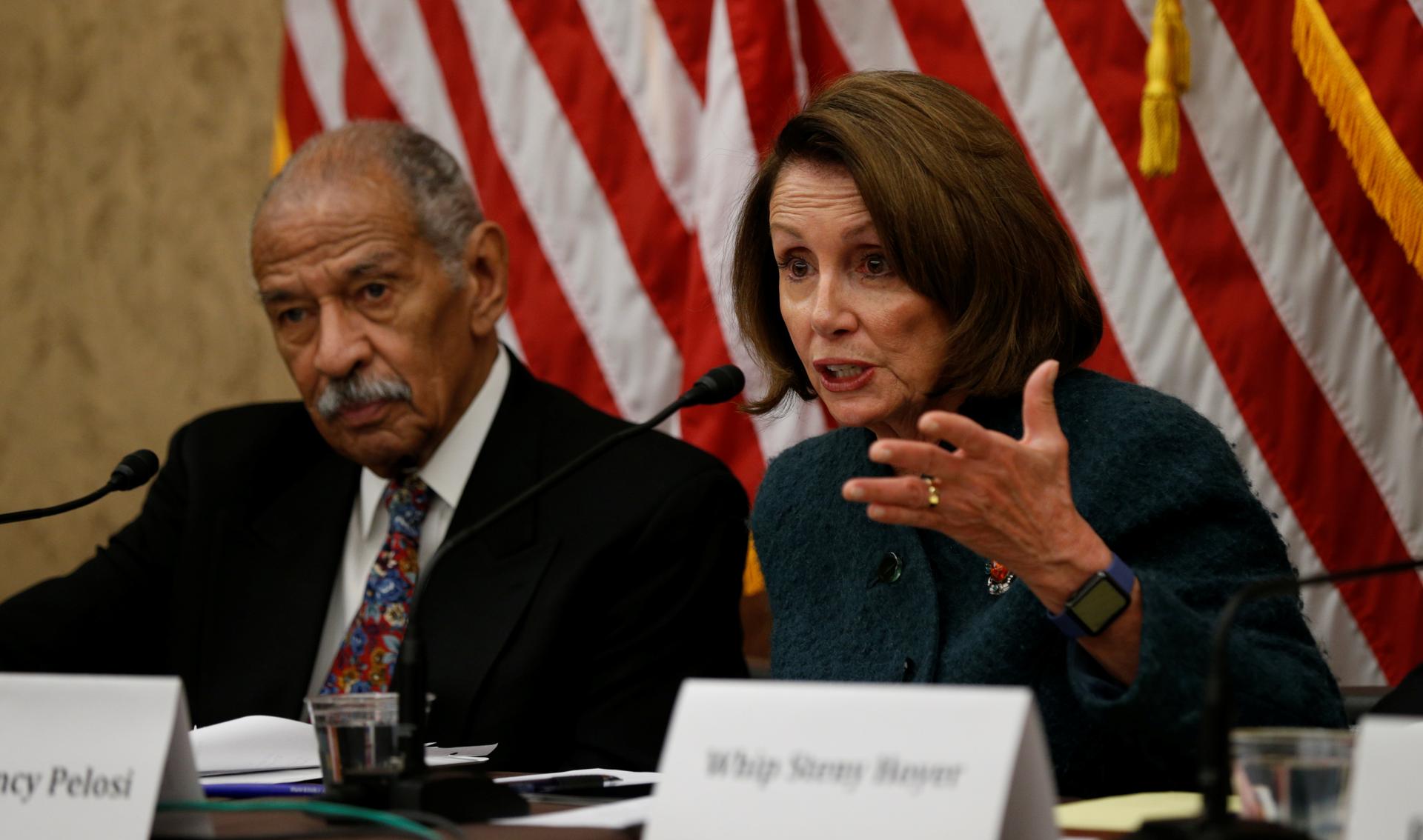#14. @realDonaldTrump Do you agree with the UN that the US owes reparations to African Americans? #100Days100Qs
House Minority Leader Nancy Pelosi (D-CA) sits beside Rep. John Conyers (D-MI) during a panel discussion at the US Capitol about Trump's immigration and refugee ban on February 2, 2017. Since 1989, Rep. Conyers has introduced onto the House floor H.R. 40, the "Commission to Study Reparation Proposals for African-Americans Act," a total of 14 times.
Mr. President, do you agree with the UN that the US owes reparations to African Americans?
Are African Americans facing a human rights crisis?
For 10 days in January 2016, a group affiliated with the United Nations called the “Working Group of Experts on People of African Descent” visited several cities in the US to answer that question.
They met with federal judges in Baltimore. They met with the attorney general in New York City. In Jackson, Mississippi, they met with the mayor's office, and in Chicago, they met with the police department. In Washington, DC, they met with staffers of the Congressional Black Caucus and White House officials. And in each of these cities, they met with black Americans, lawyers, scholars, and members of non-profits.
Eight months later, the group published its findings. The group acknowledged that the US has made and is making strides to end racial discrimination. But it also expressed alarm that black people in America continue to disproportionately face police brutality, incarceration, unemployment, housing segregation, poverty, poorly funded schools and barriers to higher education. In their words, they reported to be:
…extremely concerned about the human rights situation of African Americans. In particular, the legacy of colonial history, enslavement, racial subordination and segregation, racial terrorism and racial inequality in the United States remains a serious challenge, as there has been no real commitment to reparations and to truth and reconciliation for people of African descent. Contemporary police killings and the trauma that they create are reminiscent of the past racial terror of lynching. Impunity for State violence has resulted in the current human rights crisis and must be addressed as a matter of urgency.
Their proposed solution? That the US establish a national commission to “monitor the human rights of African Americans” — and start taking steps to repay the labor that slaves performed from American independence through the Civil War (an amount that University of Connecticut researcher Thomas Craemer values at about $5.9 trillion) with reparations.
In a December 2016 interview with “The Atlantic’s” Ta-Nehisi Coates, President Barack Obama said it would be difficult to “practically administer and sustain political support” for reparations.
But reparations can take on different forms than the restoration of unpaid wages. Georgetown University, for example, began offering “preferential admission” last year to students descended from slaves whose labor benefited the school. And officials in South Africa established a “Truth and Reconciliation Commission” to formally reckon with the consequences of apartheid.
Mr. President, you noted on Wednesday at your “Listening Session” in honor of Black History Month that you are “ready to do [your] part.” Would that including paying reparations to African Americans? Click here to tweet that question to the president.
Over President Donald Trump's roughly first 100 days, we'll be asking him questions that our audience wants answers to. Join the project by tweeting this question to @realDonaldTrump with the hashtag #100Days100Qs. See more of our questions at pri.org/100questions
Every day, reporters and producers at The World are hard at work bringing you human-centered news from across the globe. But we can’t do it without you. We need your support to ensure we can continue this work for another year.
Make a gift today, and you’ll help us unlock a matching gift of $67,000!
